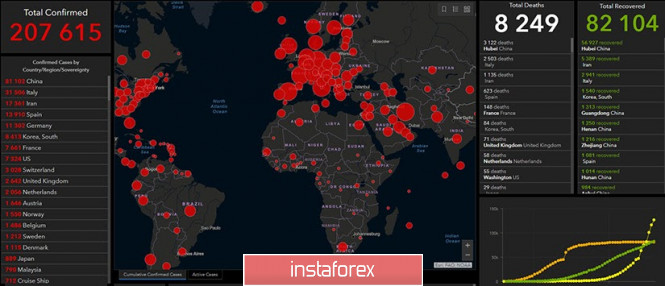
Unfortunately, the "Chinese virus", as Donald Trump called it, the COVID-19 virus continues to spread across the planet, shocking all world markets. March 18 ended with another decline in the euro and the pound, as well as oil prices and all key stock indexes in the United States. Despite the fact that the governments of the European Union and the United States said earlier that there will certainly be a recession, it is unlikely that it will reach a full-scale recession, especially considering all the monetary incentives that central banks have already implemented, as well as the fiscal incentives that are only going to be implemented and United States, and the EU. However, in practice, everything turns out completely different. The number of people infected with the pneumonia virus worldwide has exceeded 200,000, and the number of infected people in the European Union is now higher than in China. Thus, first, China, thanks to "draconian" quarantine measures, managed to localize the epidemic relatively quickly and stop its spread. But in Europe, they can't boast of such results. As a result, it was the European Union that came out on top in the world in the number of infected people.
Of course, in a situation where every day the markets are subjected to a new shock, the largest rating agencies can not stay away. At the very beginning of the crisis, which was not even considered a crisis at that time, it was expected that the world economy would lose from 0.5% to 1.5% due to the coronavirus. That is, only a slow down in the growth rate. Now world experts predict a full-scale recession, calling it a "basic" option, and the main question is how long the world will be in a new crisis and whether it will slide into a depression? It is worth explaining at once that almost every economist puts different meanings in the concept of a "recession". For example, if GDP grew by 3% in the third quarter and 2.9% in the fourth, is this a recession? Formally, yes, but experts consider a longer slowdown in growth and a more significant one as a recession. This is exactly what we are talking about now, as well as the rating agency S&P and the investment bank Morgan Stanley. S&P economists note that China's February figures were much weaker than expected. There are more and more restrictions on free movement and contacts between people in Europe and the United States. Travel and business trips are canceled en masse, schools and institutes are closing down, offices, factories and factories are empty, as everyone who can work remotely is transferred to this particular type of work. The problem is that all market participants now want to own only highly liquid assets, so there is a threat of crisis. Thus, S&P expects that eurozone GDP will decline in the second quarter by 0.5% - 1.0%. In the United States, the reduction under the most optimistic scenario will be 1.5%. All oil-oriented countries will suffer serious GDP cuts due to lower oil prices. This also applies to the United States and its oil and gas industry. Shale oil companies will find it particularly difficult, since the extraction of this type of oil is the most expensive. Also, economists of the agency note that the current scenario may well be revised downward.
Morgan Stanley economists make even harsher forecasts. In their opinion, the recession has already begun, and the decline will be much more significant than in 2008-2009. Most likely, the global economy will grow by no more than 0.9% in 2020. The bank's economists expect the eurozone to be hit the most. It is assumed that the economic downturn may reach 5%. Morgan Stanley experts also calculated that the average global refinancing rate is now 0.48%, which is lower than during the financial crisis. Also predictions for the world economy can be even worse if the impact of the virus will persist longer than predicted by experts in the field of health. In this case, it is expected that the epidemic will continue to negatively affect the economy in the third quarter of 2020, and in the fourth.
The material has been provided by InstaForex Company - www.instaforex.com